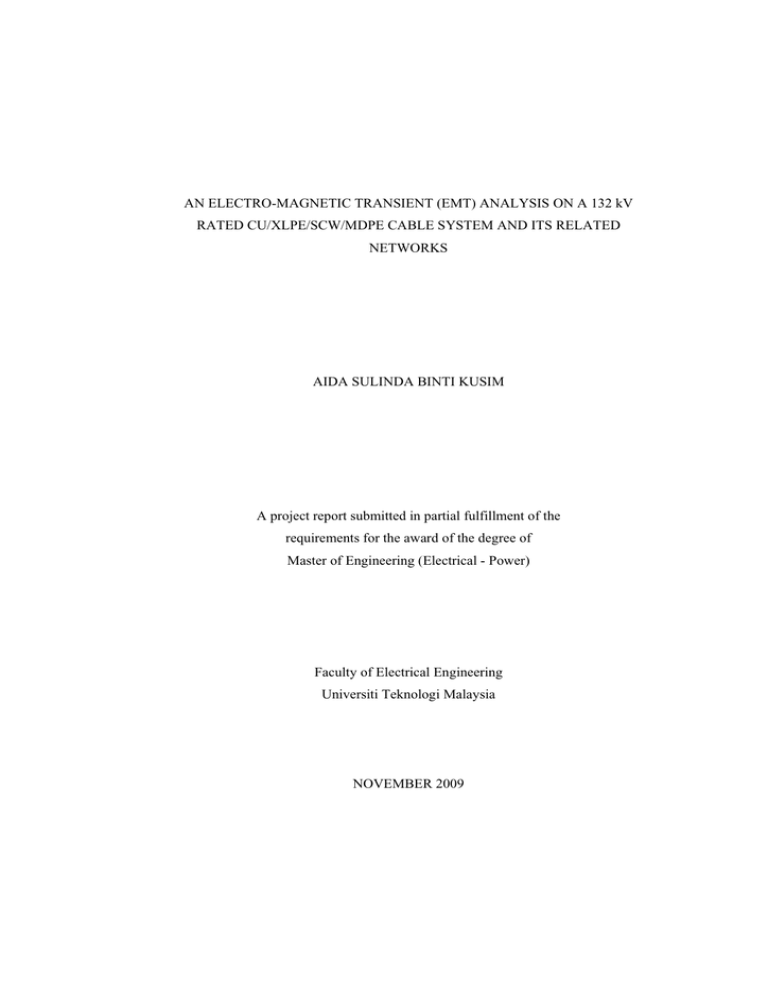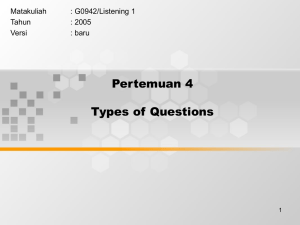AN ELECTRO-MAGNETIC TRANSIENT (EMT) ANALYSIS ON A 132
advertisement

AN ELECTRO-MAGNETIC TRANSIENT (EMT) ANALYSIS ON A 132 kV RATED CU/XLPE/SCW/MDPE CABLE SYSTEM AND ITS RELATED NETWORKS AIDA SULINDA BINTI KUSIM A project report submitted in partial fulfillment of the requirements for the award of the degree of Master of Engineering (Electrical - Power) Faculty of Electrical Engineering Universiti Teknologi Malaysia NOVEMBER 2009 iii Dedicated with love to my beloved husband, Mazwan Ab Rahim and son, Adam Mazwan. iv ACKNOWLEDGEMENT First and foremost, I would like thank Allah S.W.T for His endless blessings and favors. My sincerest gratitude to the project supervisor, Assoc. Prof. Dr Zulkurnain Abdul Malek, for his continuous and priceless support and ideas through all phases of my work. His guidance and encouragement was vital to the successful completion of this project. Thank you to dearest husband; Mazwan, son, Adam; family and friends for their undying love and support. They have been my sweetest inspiration and greatest strength through rain and shine. This project report is a token of appreciation to all. My gratitude is also extended to fellow friends at Electrical Engineering Faculty of Universiti Teknologi Malaysia, who have wonderfully helped and provided me with necessary assistance at various occasions. v ABSTRACT For the past few decades, underground cables have been extensively used to replace overhead line system which is prone to damages due to environmental phenomena. Given the wide range of advantages it offers, there is also a need to investigate whether or not lightning transient can cause underground cable insulation puncture or breakdown as it does to the overhead lines. This project was performed to investigate the likelihood of insulation failures on underground cables due to lightning currents and its induced voltages. Analysis and simulation were carried out using CDEGS software programming to determine whether or not electromagnetic transient induced by lightning can initiate overvoltages and overcurrent hence causing failure on the underground cables. A network system consisting of 132 kV Cu/XLPE/SCW/MDPE cable with a span of 150 meters was modeled into the HIFREQ module and a lightning surge was injected into the system. The significant and critical conditions of a 132 kV rated cable system that can cause insulation failure or breakdown was examined, taking into consideration the electric breakdown characteristics and some other important parameters of the system. The induced electromagnetic fields and voltages were obtained in time domain representation using Inverse Fast Fourier Transform method. The studies showed that for the varied parameters, there is no event severe enough to commence any insulation puncture in the underground cable system. vi ABSTRAK Kebelakangan ini, kabel bawah tanah telah mula digunakan secara meluas bagi mengantikan kabel talian biasa yang sangat mudah terdedah kepada bahaya yang berpunca dari fenomena alam semulajadi seperti kilat. Walaupu kabel bawah tanah sering dikaitkan dengan pelbagai kelebihan, kita masih perlu meneliti samada kilat boleh mengakibatkan kerosakan pada penebatnya sebagaimana yang selalu berlaku pada kabel talian yang biasa. Analisa ini telah dijalankan untuk mengkaji kemungkinan berlakunya kerosakan penebat pada kabel bawah tanah yang diakibatkan oleh arus kilat dan voltan yang terhasil daripadanya. Simulasi komputer dijalankan dengan menggunakan perisian CDEGS bagi mengesahkan samada ketidakstabilan elektromagnet yang terhasil dari kejadian kilat mampu mengakibatkan voltan atau arus lampau sekaligus merosakkan kabel bawah tanah tersebut. Sebuah rangkaian sistem mengandungi kabel Cu/XLPE/SCW/MDPE dengan kadar 132 kV sepanjang 150 meter telah dimodelkan ke dalam modul HIFREQ dan kejutan kilat disuntik kepadanya. Sebarang kondisi yang utama untuk sistem tersebut yang boleh menjadi punca kepada kerosakan penebat telah dikaji dengan mengambilkira faktor-faktor yang boleh menyumbang kepada kemusnahan elektrik dan beberapa parameter penting yang lain. Medan elektromagnet dan voltan yang terhasil telah diperolehi dalam bentuk masa dengan menggunakan cara IFFT. Kajian ini mendapati bahawa dengan parameter yang telah divariasikan nilainya, tidak terdapat sebarang aktiviti bahaya yang boleh mengakibatkan kemusnahan penebat pada sistem kabel bawah tanah tersebut.

